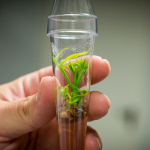Pistachio tree, one of the best clonal rootstocks.
At Meristec we use advanced techniques in the in-vitro cultivation of plant species, in order to obtain the best clonal selections.
In our catalogue product you can find a wide variety of crops, but there is one that stands out at this time of the year due to its interesting characteristics, we are talking about the pistachio tree.
Meristec commercializes the best pistachio rootstock clones plants produced through by in-vitro cultivationtissue culture, the clone UCB1. It has unique characteristics, as a high vigour and productivity rootstock, the plant size format we deliver to other nurseries is around 20 cm in height.
UCB1 is a hybrid of Pistacia Atlantica x P. integerrima obtained by the University of California. Its exceptional vigor makes the root-taking on this rootstock extremely high. In California, the usual way to use this clonal UCB1 is for the plantation orchard to be completely grafted budded on the first leaf.
It must be borne in mind that, in California, practically all orchards are irrigated, where this rootstock has been used for over 30 years, which, to this day, are still in full production. For this reason, it is a very interesting rootstock to be used in Spain under the same conditions.
This cultive becoming more important, thanks to adaptability, because it is tolerant at salinity and winter cold. Its great makes it a species that advances production, invreasing yields and with, budding takes greater than 90%.
Since 2013, we have had a group of researchers specialized in the development of plant micropropagation systems with more than 20 years’ experience in the industry. A team dedicated to laboratory work and plant tissue culture, as well as offering commercial advice on solutions for projects and plantations.
Are you interested in growing Pistachio trees? Get in touch with us -> here.





